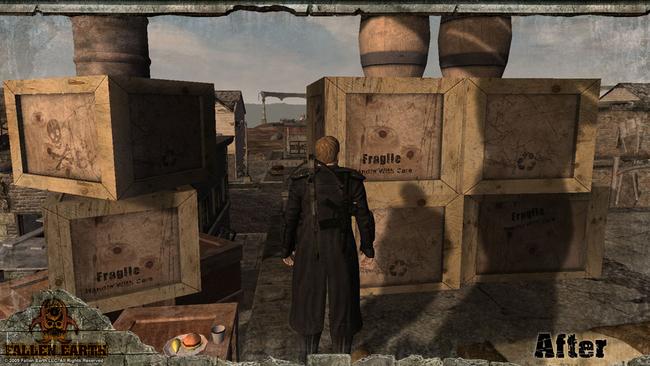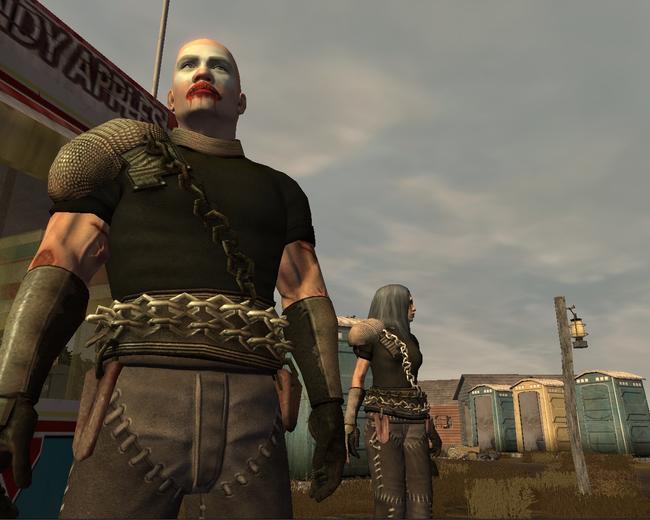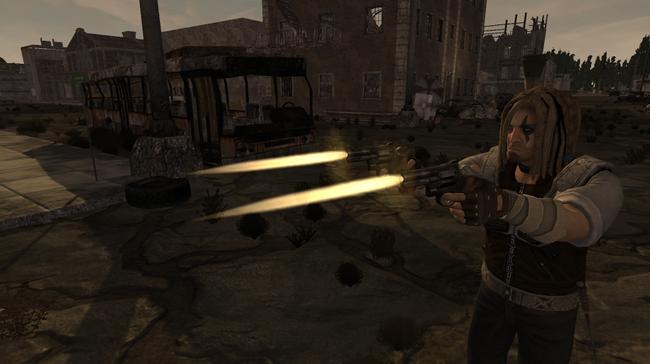
Fallout: New Vegas Review
The guys at Obsidian Entertainment have had a bit of a rough history since being founded in 2003. Rising from the ashes of the revered RPG developers Black Isle Studios, Obsidian first made Star Wars: Knights of the Old Republic 2, rushed to publishing unfinished by LucasArts, and then did a great job on Neverwinter Nights 2 and its expansion packs in 2006 through 2008.
2010 has seen them return with two titles - the first, Alpha Protocol, has great ideas executed in a less-than-satisfactory fashion but the second - Fallout: New Vegas - is for once familiar territory for the team at Obsidian. Black Isle studios, which Obsidian was birthed from, created the series. In many ways, the developer and the series have both come home.
The task for the team at Obsidian isn't easy, though - they've had to marry their story-heavy, sidequest-heavy vision of Fallout from the late 90s with the more modern, wider appealing vision that the team at Bethesda put together after their success with the formula with Oblivion.

The solution for Obsidian, it seems, was to keep the gameplay more or less identical. At a base level, New Vegas looks, sounds, feels and plays just like Fallout 3. Some of the rougher aspects of gameplay have been taken to with some sandpaper in the development process, trying to smooth them out and make them a little better, but at the core, this is the same kind of game in terms of gameplay.
There's notable changes to the way companions work, streamlining giving them orders (a must as companions are more important in this game), while weapon mods allow you to apply items like suppressors and scopes to the weapons you're using. There's also a crafting system that allows you to combine various items to concoct new instruments of death, or just reuse spent shells to house newly created bullets without having to scavenge for unused ones.
In terms of gameplay, there's a new super-hardcore mode which sounds literally impossible to my ears - it requires you keep hydrated and bullets weigh you down, for example - and there's also 'iron sights', which give you a 'Call of Duty' style view when aiming. Using that just sort of underlines the fact that Fallout isn't even close to a first person shooter, and just like in Fallout 3 much of New Vegas is going to come down to using VATS, which proudly exposes some of the numbers on the die that roll every time you pull the trigger as, after all, this is still an RPG.
Speaking of the RPG elements, all that stuff is familiar. You still level up and acquire perks and bonuses. Some are the same as Fallout 3, while others are all-new additions. Everything here feels familiar, though, and will be very easy for anyone to jump into and level efficiently, regardless of if they played Fallout 3 or not.
With the gameplay so similar, it leaves one area where Obsidian could improve significantly on Fallout 3, and it's an area they know how to do well: Story. Fallout: New Vegas drops you into the post-apocalyptic Mojave wastelands, which are full to the brim of nasty mutated creatures and survivors doing whatever they can, just like the other games - but at the centre of the wastelands is the city of New Vegas, where the game gets its title.

It takes some time to reach the titular city, but when you do it changes up the Fallout setting quite a bit - with electricity and other luxuries that can't be afforded in most Fallout colonies, New Vegas is a safe haven, but has also become a den of sin, a blur of flashing lights, gambling, corruption and violence.
New Vegas is controlled by the powerful and enigmatic Mr. House, while outside of the city various factions are vying for control. All this plays into a larger plot about choice, where your reputation with factions - what ones you do missions for, who you support and who you shoot on sight - determines what missions you can undertake later on, and how the plot will twist and turn.
While Fallout 3's Karma system is still present, it seems to not matter much at all in New Vegas. The Reputation system seems to do what it did but better, and I'm struggling to recall a moment where Karma mattered in the entire game, but the reputation system is arguably more interesting anyway.
While there's larger cogs turning in the fight for the city of New Vegas, much of the triumph of Fallout: New Vegas comes in the writing of individual characters. There's a wealth of great dialogue from the various companion characters you can pick up, giving you a great reason to talk to them, and all the major NPCs from story-vital characters to somebody who's a quest giver for a one-shot sidequest all have their motivations clear for you to see if you look and listen hard enough.
All of those characters are wonderfully cast and voice acted, and while for the unimportant NPCs there's the traditional overlap in voice actors and lines of dialogue, anybody important has been voiced expertly and directed extremely well. A good chunk of this is the atmosphere, and the voice-work goes a long way to improve that.

The story perhaps isn't clear enough about when you're hitting a point of no return with one faction or another, but other than that the branching, reputation-based story of Fallout: New Vegas not only offers each player a unique, customized experience but also offers a good deal of replay value in seeing missions and outcomes you missed the first time around. I definitely came out of New Vegas feeling like my decisions were more impactful than they were in Fallout 3.
Then there's the bugs. I'll be brutally honest: Fallout: New Vegas is a good game, but it's a broken one. The game is prone to lock-ups, enemies disappearing into the ground or behind walls so they can't be killed, quest-vital NPCs disappearing off the face of the wasteland completely, and, as I discovered with my first save, two hours in, random corruption of save games.
I could spend hours listing off some of the whacky, crazy stuff I've seen this game spit out at me, but a quick search online will reveal a wealth of people playing with the same problems, and many crazier. This same engine saw some crazy bugs in Oblivion and Fallout 3, too, but New Vegas seems to be the most obviously bug-ridden out of the gate of the three.
Obsidian and Bethesda are already working on fixing this, and they've already issued a couple of patches, and things are slowly but surely improving. If you're the kind of person who can look past crazy bugs and broken segments because there's a great game underneath, you'll be fine. If not, wait for a few more patches.
After how successful Fallout 3 was, more of the same gameplay is something that was expected and is actually pretty welcome. It's a shame that right now there are so many bugs and technical problems breaking the game on all three formats, as that's enough to prevent it from being a better game than its predecessor in my eyes. If you love games with a great story or loved Fallout 3 and can look past the bugs, New Vegas is a must-play.
If not? Wait for a few more patches to drop.